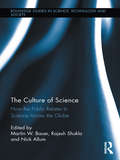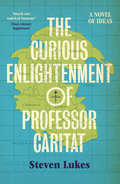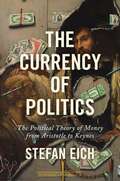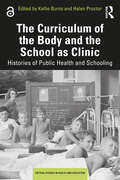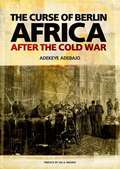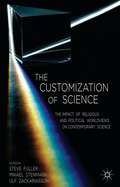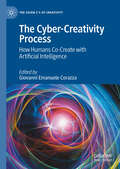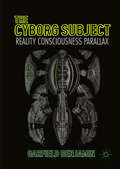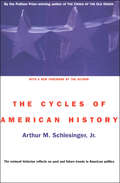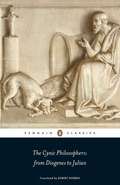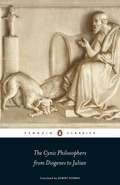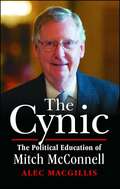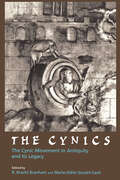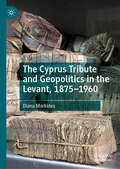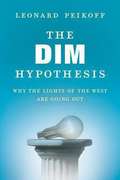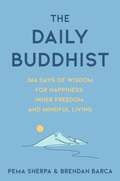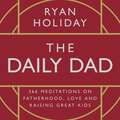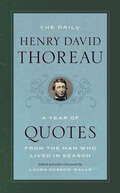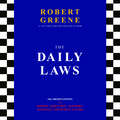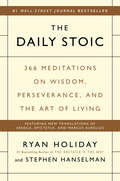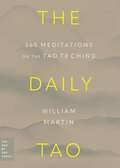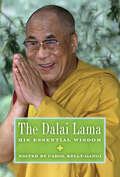- Table View
- List View
The Culture of Science: How the Public Relates to Science Across the Globe (Routledge Studies in Science, Technology and Society)
by Rajesh Shukla Martin W. Bauer Nick AllumThis book offers the first comparative account of the changes and stabilities of public perceptions of science within the US, France, China, Japan, and across Europe over the past few decades. The contributors address the influence of cultural factors; the question of science and religion and its influence on particular developments (e.g. stem cell research); and the demarcation of science from non-science as well as issues including the ‘incommensurability’ versus ‘cognitive polyphasia’ and the cognitive (in)tolerance of different systems of knowledge.
The Curious Enlightenment of Professor Caritat
by Steven LukesThe Curious Enlightenment of Professor Caritat is a brilliant fictional journey through Western political philosophy by one of our most original thinkers. Professor Caritat, a middle-aged Candide, walks naively through the neighbouring countries of Utilitaria, Communitaria and Libertaria, in his quest to find the best of all possible worlds. Cut loose from the confines of his ivory tower, this wandering professor is made to confront the perplexed state of modern thinking in this dazzling comedy of ideas.From the Trade Paperback edition.
The Currency of Politics: The Political Theory of Money from Aristotle to Keynes
by Stefan EichMoney in the history of political thought, from ancient Greece to the Great Inflation of the 1970sIn the wake of the 2008 financial crisis, critical attention has shifted from the economy to the most fundamental feature of all market economies—money. Yet despite the centrality of political struggles over money, it remains difficult to articulate its democratic possibilities and limits. The Currency of Politics takes readers from ancient Greece to today to provide an intellectual history of money, drawing on the insights of key political philosophers to show how money is not just a medium of exchange but also a central institution of political rule.Money appears to be beyond the reach of democratic politics, but this appearance—like so much about money—is deceptive. Even when the politics of money is impossible to ignore, its proper democratic role can be difficult to discern. Stefan Eich examines six crucial episodes of monetary crisis, recovering the neglected political theories of money in the thought of such figures as Aristotle, John Locke, Johann Gottlieb Fichte, Karl Marx, and John Maynard Keynes. He shows how these layers of crisis have come to define the way we look at money, and argues that informed public debate about money requires a better appreciation of the diverse political struggles over its meaning.Recovering foundational ideas at the intersection of monetary rule and democratic politics, The Currency of Politics explains why only through greater awareness of the historical limits of monetary politics can we begin to articulate more democratic conceptions of money.
The Curriculum of the Body and the School as Clinic: Histories of Public Health and Schooling (Critical Studies in Health and Education)
by Helen Proctor Kellie BurnsThis collection brings together cutting-edge research on the history of embodiment, health and schooling in an international context. The book distinguishes a set of educational technologies, schooling practices and school-based public health programmes that organise and influence the bodies of children and young people, defining the curriculum of the body. Taking a historical approach, with a focus on the period in which mass schooling became an international phenomenon, the book is organised according to four major themes. The first positions the school as a modern clinical space, followed by the second that explores programmes and curricula which influence the discipline of and care for the body. The third section examines the role of the built environment on the organisation and experience of children’s bodies, and the final section outlines the pedagogies, rules and routines that determine how the body is treated and experienced in school. International and multidisciplinary in scope, this unique collection is of interest to postgraduate students and researchers in education and public health, as well as history, policy studies and sociology.
The Curriculum of the Body and the School as Clinic: Histories of Public Health and Schooling (Critical Studies in Health and Education)
by Helen ProctorThis collection brings together cutting-edge research on the history of embodiment, health and schooling in an international context. The book distinguishes a set of educational technologies, schooling practices and school-based public health programmes that organise and influence the bodies of children and young people, defining the curriculum of the body.Taking a historical approach, with a focus on the period in which mass schooling became an international phenomenon, the book is organised according to four major themes. The first positions the school as a modern clinical space, followed by the second that explores programmes and curricula which influence the discipline of and care for the body. The third section examines the role of the built environment on the organisation and experience of children’s bodies, and the final section outlines the pedagogies, rules and routines that determine how the body is treated and experienced in school.International and multidisciplinary in scope, this unique collection is of interest to postgraduate students and researchers in education and public health, as well as history, policy studies and sociology.
The Curse of Berlin: Africa After the Cold War
by Adekeye AdebajoThe first Session: The African Union and sub-regional bodies; another on the political, peacekeeping, and socioeconomic roles of the United Nations (UN) in Africa; and a third on Africa's two UN Secretaries-General between 1992 and 2006: The second section of the book focuses on Africa's quest for leadership, and five chapters examine the hegemonic roles of South Africa, Nigeria, the United States, China and France on the continent. The five chapters in the final section of the study analysis Africa's quest for unity, and examine the roles and significance for Africa.
The Customization of Science
by Steve Fuller Mikael Stenmark Ulf ZackariassonThis collection explores whether and how religious and secular worldviews and political ideologies held by scientists, citizens, decision-makers and politicians influence science as practiced and understood today. Contributors explore the social and scientific repercussions of 'customizing' science to fit the needs and interests of various groups.
The Cyber-Creativity Process: How Humans Co-Create with Artificial Intelligence (The Seven C’s of Creativity)
by Giovanni Emanuele CorazzaThis edited book explores the process of creating using the seven C's of creativity framework. It discusses the creative process as a collaboration between humans and Artificial Intelligence (AI), here identified as the cyber-creativity process. Through nine chapters written by leading scholars in the field, this collection delves into the rapidly emerging area of Generative-AI (Gen-AI) applications and sheds light on the parts of the creative process that will remain fundamentally human throughout the foreseeable future, as well as those that will benefit more from AI-augmentation. Drawing on the dynamic definition of creativity, the contents encompass the Dynamic Universal Creative Process (DUCP) and the DA VINCI model, the design principles of Gen-AI algorithms, the cyber-creativity process in education, journalism, design, fashion, music, and its implications on intellectual property protection. A timely reflection on the complex and evolving relation between creativity and technology, this volume will interest academics, researchers, and students alike across humanities, social and hard sciences.
The Cyborg Subject
by Garfield BenjaminThis book outlines a new conception of the cyborg in terms of consciousness as the parallax gap between physical and digital worlds. The contemporary subject constructs its own internal reality in the interplay of the Virtual and the Real. Reinterpreting the work of Slavoj Žižek and Gilles Deleuze in terms of the psychological and ontological construction of the digital, alongside the philosophy of quantum physics, this book offers a challenge to materialist perspectives in the fluid cyberspace that is ever permeating our lives. The inclusion of the subject in its own epistemological framework establishes a model for an engaged spectatorship of reality. Through the analysis of online media, digital art, avatars, computer games and science fiction, a new model of cyborg culture reveals the opportunities for critical and creative interventions in the contemporary subjective experience, promoting an awareness of the parallax position we all occupy between physical and digital worlds.
The Cycles of American History
by Arthur M. Schlesinger Jr.A Pulitzer Prize–winning historian discusses &“the Cold War, political parties, the presidency, and many broader philosophical issues [with] incisive wit&” (Library Journal). A celebrated historian, speechwriter, and adviser to President Kennedy, Arthur M. Schlesinger Jr. draws on decades of astute observation to construct a dialectic of American politics, or as Time magazine called it, a &“recurring struggle between pragmatism and idealism in the American soul.&” The Cycles of American History traces two conflicting visions of America—Experiment vs. Destiny—through two centuries of political evolution, conflict, and progress. In this updated edition, Schlesinger reflects on the dawn of a new millennium and how new social and technological revolutions could lead to a revolution in American political cycles. &“Whatever the nation&’s political future, it can benefit from the intelligence and regard for our country&’s best traditions evident in these informed and humane essays.&” —TheNew York Times &“Displays the author at his best: trenchant, erudite, crisp.&” —Foreign Affairs &“An excellent and provocative primer on the challenges surrounding the contemporary American political setting . . . First-rate history mixed with a strong sense of public service.&” —The Christian Science Monitor
The Cyclist and His Shadow: A Memoir (Univocal)
by Olivier HaralambonA philosopher and former racing cyclist examines how competitive riders lose their sense of self as they pursue perfect motion and mastery over pain After ten years as a racing cyclist, riding in up to ninety races a year, Olivier Haralambon became a journalist and philosopher. In The Cyclist and His Shadow, he writes about the world of competitive cycling with rare honesty and self-reflection, exploring it not merely as a sport but as a spiritual and artistic practice, imbued with a mystical quality. In prose at once poetic and precise, Haralambon depicts the intensity of cycling as physical activity in which the rider&’s consciousness becomes inseparable from the instantaneous movements of limbs, the exertion of heart and lungs, and the marshaling and expenditure of energy. He describes riding as an ascetic activity always accompanied by pain that the cyclist can control but never fully eliminate. But cycling for Haralambon is not only suffering but also an addictively pleasurable activity in which the rider&’s sense of self dissolves and melds with the bicycle, mind and body exploring the vibrant solitude of the course and limits of human endurance. Engaging in the repetition of ascension and the endless hours immersed in an oceanic interior, cyclists are artists in the vastness of landscape, both interior and exterior.Published in association with The Cycling Podcast (https://thecyclingpodcast.com), The Cyclist and His Shadow offers an illuminating meditation on what drives cyclists to devote their lives and bodies to training, racing, and even doping. Drawing from personal experience, Haralambon presents cycling as simultaneously physical and creative, technological and mystical, torturous and ecstatic.
The Cynic Philosophers: From Diogenes To Julian
by Robert DobbinThe Greek Cynics owned no property and rejected fame and fortune, living almost entirely out of doors while surviving on wild plants and water from natural springs. They promoted ideals such as self-sufficiency, freedom, detachment, shamelessness, and toughness, and their philosophy penetrated not only Greek but also Roman civilization. This unique anthology draws together the writings on and by various Cynic philosophers, from founding figures Antisthenes and Diogenes of Sinope to Hipparchia, one of the few female philosophers in antiquity, and fourth-century Roman emperor Julian "the apostate."
The Cynic Philosophers: from Diogenes to Julian
by Lucian Diogenes of Sinope Emperor Julian'Poverty does not consist in the want of money,' I answered, 'nor is begging to be deplored. Poverty consists in the desire to have everything, and through violent means if necessary'From their founding in the fifth century BC and for over 800 years, the Cynic philosophers sought to cure humanity of greed and vice with their proposal of living simply. They guaranteed happiness to their adherents through freedom of speech, poverty, self-sufficiency and physical hardiness. In this fascinating and completely new collection of Cynic writing through the centuries, from Diogenes and Hipparchia, to Lucian and the Roman emperor Julian, the history and experiences of the Cynic philosophers are explored to the full.Robert Dobbin's introduction examines the public image of the Cynics through the ages, as well as the philosophy's contradictions and how their views on women were centuries ahead of their time. This edition also includes notes on the text, chronology, glossary and suggested further reading.Translated, edited and with an introduction by Robert Dobbin
The Cynic: The Political Education of Mitch McConnell
by Alec MacgillisFrom a dogged political reporter, an investigation into the political education of Mitch McConnell and an argument that this powerful Senator embodies much of this country's political dysfunction.Based on interviews with more than seventy-five people who have worked alongside Mitch McConnell or otherwise interacted with him over the course of his career, The Cynic, which will be published as an original ebook, is both a comprehensive biography of one of this country's most powerful politicians and a damning diagnosis of this country's eroding political will. Tracing his rise from a pragmatic local official in Kentucky to the leader of the Republican opposition in Washington, the book tracks McConnell's transformation from a moderate Republican who supported abortion rights and public employee unions to the embodiment of partisan obstructionism and conservative orthodoxy on Capitol Hill. Driven less by a shift in ideological conviction than by a desire to win elections and stay in power at all costs, McConnell's transformation exemplifies the "permanent campaign" mindset that has come to dominate American government. From his first race for local office in 1977--when the ad crew working on it nicknamed McConnell "love-me-love-me" for his insecurity and desire to please--to his fraught accommodation of the Tea Party, McConnell's political career is a story of ideological calcification and a vital mirror for understanding this country's own political development and what is wrought when politicians serve not at the behest of country, but at the behest of party and personal aggrandizement.
The Cynics: The Cynic Movement in Antiquity and Its Legacy (Hellenistic Culture and Society #23)
by Marie-Odile Goulet-Cazé R. Bracht BranhamThis collection of essays—the first of its kind in English—brings together the work of an international group of scholars examining the entire tradition associated with the ancient Cynics. The essays give a history of the movement as well as a state-of-the-art account of the literary, philosophical and cultural significance of Cynicism from antiquity to the present.Arguably the most original and influential branch of the Socratic tradition, Cynicism has become the focus of renewed scholarly interest in recent years, thanks to the work of Sloterdijk, Foucault, and Bakhtin, among others. The contributors to this volume—classicists, comparatists, and philosophers—draw on a variety of methodologies to explore the ethical, social and cultural practices inspired by the Cynics. The volume also includes an introduction, appendices, and an annotated bibliography, making it a valuable resource for a broad audience.
The Cyprus Tribute and Geopolitics in the Levant, 1875–1960
by Diana MarkidesThis book examines the history of the Cyprus Tribute, and takes a longer and broader view of the issue than previous studies. It analyses the regional context of the decision to use revenue surpluses for the repayment of debt within the framework of the Eastern Question and Ottoman bankruptcy. We see that the island was always strategically and financially overshadowed by Egypt. Scrutinising political developments in Cyprus through the prism of the tribute issue facilitates a better understanding of its considerable effect on them. The absence of any imperial role for Cyprus as a 'place d’armes’ meant that there was no imperial interest in funding the infrastructural development of the island. British policy was treasury-driven. Diana Markides analyses why it failed, and how its failure resulted in the local colonial government having to impose a deeply unpopular fiscal policy, for which there was no adequate explanation. She examines the extent to which local resistance to this policy affected not only constitutional development on the island and Anglo-Cypriot relations, but the nature of the relations between the two major communities.
The DIM Hypothesis
by Leonard PeikoffWith his groundbreaking and controversial DIM hypothesis, Dr. Leonard Peikoff casts a penetrating new light on the process of human thought, and thereby on Western culture and history. In this far-reaching study, Peikoff identifies the three methods people use to integrate concrete data into a whole, as when connecting diverse experiments by a scientific theory, or separate laws into a Constitution, or single events into a story. The first method, in which data is integrated through rational means, he calls Integration. The second, which employs non-rational means, he calls Misintegration. The third is Disintegration--which is nihilism, the desire to tear things apart. In The DIM Hypothesis Peikoff demonstrates the power of these three methods in shaping the West, by using the categories to examine the culturally representative fields of literature, physics, education, and politics. His analysis illustrates how the historical trends in each field have been dominated by one of these three categories, not only today but during the whole progression of Western culture from its beginning in Ancient Greece. Extrapolating from the historical pattern he identifies, Peikoff concludes by explaining why the lights of the West are going out--and predicts the most likely future for the United States.
The Daily Buddhist: 366 Days of Wisdom for Happiness, Inner Freedom, and Mindful Living
by Pema Sherpa Brendan Barca366 daily doses of profound and practical Buddhist teachings for true transformation.Why do so many people still embrace the wisdom of Buddhism, even after twenty-five hundred years? The answer lies in the fact that, although the world may look different now, humans still grapple with the same fundamental challenges: overwhelming emotions, discontentment, and a longing for happiness. These are the very challenges that Buddhist philosophy can help us overcome, empowering us to transform into fearless, compassionate, and joyful individuals. Buddhism provides a framework we can use to lead a great life—one in which we are kinder, have greater resilience, are more adaptable to change, and experience greater lightness and joy.The Daily Buddhist offers daily teachings of Buddhist wisdom and practices to help us navigate the challenges of everyday life. Drawing from many of the greatest Buddhist masters throughout history—renowned Indian philosophers like Nagarjuna and Santideva; Tibetan masters like Milarepa, Patrul Rinpoche, and Chögyam Trungpa; and, of course, the Buddha himself—the authors, Buddhist scholars and practitioners, deliver daily doses of Buddhist insights tailored for 21st century living. Each day of the year, you’ll receive an insightful quote from a Buddhist master paired with a thought-provoking reflection that’s accessible, practical, and modern.Over the course of the year, you’ll learn:How mindfulness can help you find inner peaceHow to make friends with yourself through meditationHow to overcome difficult emotions like anger, jealousy, and anxietyWhy cultivating compassion leads to happinessWhy you are not your thoughtsHow to tame your inner criticHow to discover happiness that actually lastsThis profound yet practical approach to Buddhist philosophy provides tools for true transformation. By the end of the year, you'll see the world and your mind in a new light, propelling you along the path to lasting happiness, self-mastery, and inner freedom.
The Daily Dad: 366 Meditations on Fatherhood, Love and Raising Great Kids
by Ryan HolidayWhat does it mean to be a great father? And how do you become one? Parenting is a role filled with meaning and purpose, but every dad needs guidance: because fatherhood is not a one-off, it is something you do every day. Instead of a parenting book you read once as a sleep-deprived new parent, The Daily Dad provides 366 accessible meditations on fatherhood, one for each day of the year. Drawing quotes from history, literature and psychology, bestselling author Ryan Holiday - a father of two himself - has crafted a daily practice that will help dads old and new to find inspiration and advice. Each entry offers a memorable lesson on beingthe role model your child needs, rooted in timeless principles.From Socrates to Martin Luther King Jr., ancient philosophy to contemporary figures, The Daily Dad collates wisdom from around the world to help every dad face the day-to-day challenges in the lifelong job of parenting, and ultimately become the best father they can be.
The Daily Henry David Thoreau: A Year of Quotes from the Man Who Lived in Season (A Year of Quotes)
by Henry David Thoreau“Live in each season as it passes; breathe the air, drink the drink, taste the fruit, and resign yourself to the influence of each.” Modernity rules our lives by clock and calendar, dividing the stream of time into units and coordinating every passing moment with the universal globe. Henry David Thoreau subverted both clock and calendar, using them not to regulate time’s passing but to open up and explore its presence. This little volume thus embodies, in small compass, Thoreau’s own ambition to “live in season”—to turn with the living sundial of the world, and, by attuning ourselves to nature, to heal our modern sense of discontinuity with our surroundings. Ralph Waldo Emerson noted with awe that from flowers alone, Thoreau could tell the calendar date within two days; children remembered long into adulthood how Thoreau showed them white waterlilies awakening not by the face of a clock but at the first touch of the sun. As Thoreau wrote in Walden, “Time is but the stream I go a-fishing in. I drink at it; but while I drink I see the sandy bottom and detect how shallow it is.” Drawn from the full range of Thoreau’s journals and published writings, and arranged according to season, The Daily Henry David Thoreau allows us to discover the endless variation and surprise to be found in the repetitions of mundane cycles. Thoreau saw in the kernel of each day an earth enchanted, one he honed into sentences tuned with an artist’s eye and a musician’s ear. Thoreau’s world lives on in his writing so that we, too, may discover, even in a fallen world, a beauty worth defending.
The Daily Laws: 366 Meditations on Power, Seduction, Mastery, Strategy and Human Nature
by Robert GreeneOver the last 22 years, Robert Greene has provided insights into every aspect of being human whether that be getting what you want, understanding others' motivations, mastering your impulses, and recognizing strengths and weaknesses. The Daily Robert Greene distills that wisdom into daily entries.Each entry delivers refined and concise wisdom from one of his books, in an easy to digest lesson that will only take a few minutes to read, as well as a Commandment -- a prescription or prompt for the reader to follow.Not only is the Daily Robert Greene the perfect entry point for those new to Greene's penetrating insight, but it will also help the many Greene fans throughout the world understanding and internalizing the many lessons that fill his books. It is a guide to a lifetime of reading and re-reading about power, seduction, strategy, psychology and human nature.
The Daily Stoic: 366 Meditations on Wisdom, Perseverance, and the Art of Living
by Ryan Holiday Stephen HanselmanFrom the team that brought you The Obstacle is The Way and Ego is The Enemy, a beautiful daily devotional of Stoic meditations.Why have history's greatest minds--from George Washington to Frederick the Great to Ralph Waldo Emerson, along with today's top performers from Super Bowl-winning football coaches to CEOs and celebrities--embraced the wisdom of the ancient Stoics? Because they realize that the most valuable wisdom is timeless and that philosophy is for living a better life, not a classroom exercise.The Daily Stoic offers a daily devotional of Stoic insights and exercises, featuring all-new translations from the Emperor Marcus Aurelius, the playwright Seneca, or slave-turned-philosopher Epictetus, as well as lesser-known luminaries like Zeno, Cleanthes, and Musonius Rufus. Every day of the year you'll find one of their pithy, powerful quotations, as well as historical anecdotes, provocative commentary, and a helpful glossary of Greek terms. By following these teachings over the course of a year (and, indeed, for years to come) you'll find the serenity, self-knowledge, and resilience you need to live well. From the Hardcover edition.
The Daily Tao: 365 Meditations on the Tao Te Ching (Day by Day Series #3)
by William MartinChoose peace over distraction and flexibility over fear with this accessible daily guide to the timeless wisdom of the Tao Te Ching. Whether you begin your morning with the Tao or snatch a spare moment of calm in the hurry of the day, The Daily Tao–with a reading from the Tae Te Ching for every day of the year–will create a practice of reflection that will echo through your life. Author William Martin's extensive work on the Tao has been embraced by countless readers and praised by the likes of Oprah and Alice Walker. Drawing on work first shared in his beloved book A Path and a Practice, this original translation of the Tao maintains the lyrical poeticism of the text while making its wisdom accessible for all. The Daily Tao is part of The Day by Day series, a collection of books designed to help readers infuse the rhythms of their lives with meaning and intention. Our lives are built by small choices, tiny moments, and quiet thoughts–The Day by Day series is a gentle way to choose those moments and begin to build a life you love.
The Daily Thomas Paine: A Year of Common-Sense Quotes for a Nonsensical Age (A Year of Quotes)
by Thomas PaineThomas Paine was the spark that ignited the American Revolution. More than just a founding father, he was a verbal bomb-thrower, a rationalist, and a rebel. In his influential pamphlets Common Sense and The American Crisis, Paine codified both colonial outrage and the intellectual justification for independence, arguing consistently and convincingly for Enlightenment values and the power of the people. Today, we are living in times that, as Paine famously said, “try men’s souls.” Whatever your politics, if you’re seeking to understand the political world we live in, where better to look than Paine? The Daily Thomas Paine offers a year’s worth of pithy and provocative quotes from this quintessentially American figure. Editor Edward G. Gray argues that we are living in a moment that Thomas Paine might recognize—or perhaps more precisely, a moment desperate for someone whose rhetoric can ignite a large-scale social and political transformation. Paine was a master of political rhetoric, from the sarcastic insult to the diplomatic aperçu, and this book offers a sleek and approachable sampler of some of the sharpest bits from his oeuvre. As Paine himself says in the entry for January 20: “The present state of America is truly alarming to every man who is capable of reflexion.” The Daily Thomas Paine should prove equally incendiary and inspirational for contemporary readers with an eye for politics, even those who prefer the tweet to the pamphlet.
The Dalai Lama (Essential Wisdom)
by Carol KellyGangiHundreds of wise and inspiring quotations from the Tibetan spiritual leader.“This is my simple religion. There is no need for temples; no need for complicated philosophy. Our own brain, our own heart is our temple; the philosophy is kindness.”His Holiness the Dalai Lama has traveled the globe to spread his undying message of compassion, love, peace, and kindness for close to a half-century. The Dalai Lama: His Essential Wisdom is a collection of hundreds of inspiring quotations from His Holiness. The selections are drawn largely from his writings, teachings, interviews, speeches, and other statements made during the course of his more than forty-eight years as the exiled spiritual leader of the Tibetan people.He reflects with wisdom upon the search for happiness, the way to peace, the meaning of pain and suffering, the role of religion, the power of meditation, and the challenges of life in the modern world. In other selections, His Holiness recalls his singular childhood and the turmoil surrounding the Communist takeover of Tibet. Brimming with warmth, humor, and practical advice, the words gathered here powerfully illuminate why His Holiness the Dalai Lama is beloved the world over for his timeless wisdom for all humanity. “Everybody loves to talk about calm and peace whether in a family, national, or international context, but without inner peace how can we make real peace? World peace through hatred and force is impossible.”
